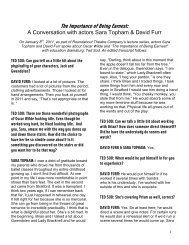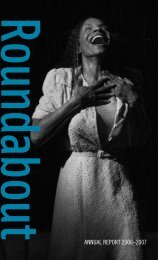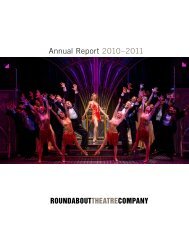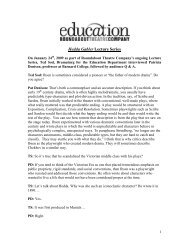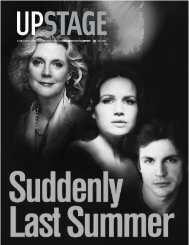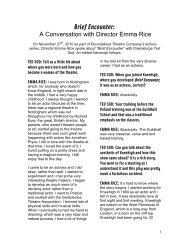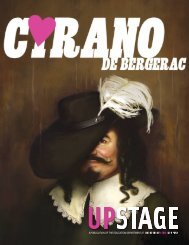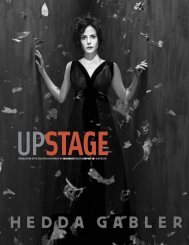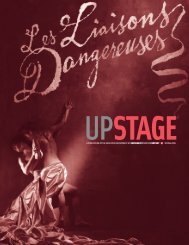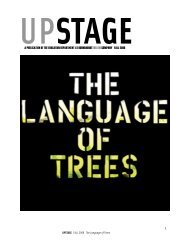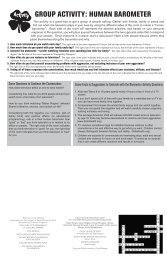The Language Archive - Roundabout Theatre Company
The Language Archive - Roundabout Theatre Company
The Language Archive - Roundabout Theatre Company
You also want an ePaper? Increase the reach of your titles
YUMPU automatically turns print PDFs into web optimized ePapers that Google loves.
EMMA:<br />
I never knew speaking a language required so much… bravery.<br />
INSTRUCTOR:<br />
My dear. Nothing on earth could possibly require more.<br />
Click here for a SNEAK PEEK of <strong>The</strong> <strong>Language</strong> <strong>Archive</strong>!
How Do You Express Yourself?<br />
Interview with the Playwright: Julia Cho 4<br />
Interview with the Director: Mark Brokaw 6<br />
World of the Play 8<br />
Interview with Archivist Tiffany Nixon 11<br />
Activities 12<br />
Glossary 21<br />
Resources 24<br />
Contributors:<br />
Greg McCaslin<br />
Jennifer DiBella<br />
Sarah Malone<br />
Aliza Greenberg<br />
Ted Sod<br />
Erin Monahan<br />
Jason Jacobs<br />
Karla Hendrick<br />
Education Director<br />
Associate Education Director<br />
Education Program Associate<br />
Education Program Associate<br />
Education Dramaturg<br />
Education Apprentice<br />
Teaching Artist<br />
Teaching Artist<br />
Cover Illustration<br />
Production Photos<br />
Design<br />
Darren Booth<br />
Joan Marcus<br />
Mike DiBella<br />
Copyright © 2010 <strong>Roundabout</strong> <strong>The</strong>atre <strong>Company</strong>, inc. All rights reserved.<br />
ROUNDABOUTTHEATRECOMPANY 231 West 39th Street, Suite 1200, New York, NY 10018<br />
Telephone: 212.719.9393 Fax: 212.869.8817 www.roundabouttheatre.org.
Expression Through Writing<br />
INTERVIEW WITH THE PLAYWRIGHT: JULIA CHO<br />
4<br />
UPSTAGE<br />
INTERVIEWED<br />
PLAYWRIGHT<br />
JULIA CHO<br />
TO GET HER<br />
THOUGHTS ON<br />
THE SCRIPT.<br />
What inspired you to write<br />
<strong>The</strong> <strong>Language</strong> <strong>Archive</strong>?<br />
One spark for the play came<br />
from a newspaper article about<br />
the last speaker of a language<br />
passing away. It was the first<br />
time I realized languages could<br />
be endangered or extinct and the<br />
idea made me enormously sad.<br />
I’d always thought of language as<br />
something persistent and omnipresent,<br />
and suddenly I saw how fragile it was and how easily<br />
it could be lost. But I don’t think I consciously set out to<br />
write a play about extinct tongues. What interested me most<br />
was the kind of person who would care about such a thing, a<br />
person who would devote his or her life to the preservation<br />
of something that was impossible to save.<br />
What do you think your play is about? Does the play have<br />
personal resonance for you and if so, how?<br />
At its most reductive, it’s about communication and relationships.<br />
But it’s a play that also celebrates<br />
language – its beauty, inventiveness<br />
and variety. I envy people<br />
who can speak many languages. But<br />
I also think that even within the same<br />
language there are many different<br />
modes of speaking. And so the play<br />
is also about the languages within language<br />
– how a couple or even a person<br />
can have a language that is unique and<br />
particular.<br />
On a more personal level, a lot of the<br />
play also grew out of my own sense of<br />
loss. My parents speak Korean but I<br />
never learned it. And so when I was reading about how easily<br />
languages go extinct, I really took it to heart. I’ve always<br />
felt guilty for not speaking Korean but in a way, that guilt has<br />
been a gift. Because without it, I probably never would’ve<br />
thought to write this play.<br />
How did you research the world of the play? What kind of<br />
research did you do?<br />
I read some books and articles – there’s one article by Jack<br />
Hitt that is particularly well-written. But most of the world<br />
of the play is made up. I’m not a very good researcher. I<br />
sometimes find that the more I know, the more limited my<br />
imagination becomes.<br />
THE LANGUAGE ARCHIVE<br />
Did the play evolve much in rehearsals during its development<br />
process/South Coast Rep premiere? Will it change for<br />
the NYC production?<br />
I’d done a staged reading of the play with Mark Brokaw at<br />
SCR a year before the production as part of their Pacific<br />
“IS ABOUT LANGUAGE AS A<br />
METAPHOR FOR LOVE” AND<br />
THUS ABOUT THE ABILITY<br />
(OR INABILITY) TO EXPRESS<br />
ONE’S FEELINGS.<br />
– JULIA CHO<br />
Playwrights Festival. That was a crucial step in the play’s<br />
development because I came into the Festival with a new<br />
draft that I was very uncertain about. Somehow I’d lost my<br />
bearings with the play. All I could see were the flaws and I’d<br />
written a new draft in an attempt to fix the play and clarify<br />
things that seemed confusing or muddled.<br />
Mark had the cast read the new draft<br />
and then also read the previous draft<br />
and he encouraged me to go back to<br />
the earlier one. That was enormously<br />
helpful. It helped me find the play<br />
again and reset my compass. I felt<br />
like a musician who’d gone temporarily<br />
tone deaf, and that reading – plus<br />
Mark’s invaluable insight and advice<br />
– helped me regain my ear.<br />
From there, we continued to develop<br />
the play at the O’Neill Playwrights<br />
Conference. And that was another<br />
crucial step because it was there<br />
that Mark and I really had the time<br />
to discuss the play and learn each other’s language. By the<br />
time we got to the production at SCR, the play was fairly far<br />
along. I made changes, of course, but they weren’t major<br />
structural ones. I’ll continue to make tweaks as we move forward<br />
into the NYC production. But the rewriting has become<br />
very fine-tuned and precise.<br />
Can you describe what you look for in a director? In casting<br />
actors?<br />
I think all playwrights have a similar wish list: we all want a<br />
director who’s smart, theatrical, great with actors and passionate<br />
about working on new plays. And there’s actually a<br />
fair number of directors who fit this bill. But I also look for an<br />
extra quality; I’ll call it a good heart, though even that doesn’t<br />
entirely capture it. As someone who’s pretty private, I don’t<br />
want to let anyone in I don’t trust and feel safe with. And so<br />
I look for the good-hearted: people who are generous, warm<br />
and honest – as well as brilliant. It is my enormous good luck
that every director I’ve worked with has been just that.<br />
As for actors, Gordon Edelstein, taught me a good lesson.<br />
When we were casting BFE, he advocated Karen Kandel for<br />
the part of Evvie. It wasn’t just because Karen was – and is<br />
– a brilliant actor. Gordon insisted that we had to cast Karen<br />
because her very presence would bless the process. And<br />
he was absolutely right. I don’t know how to describe it, but<br />
there are just some actors who bring good energy into the<br />
room. Whether it’s because they’re so skilled or so generous,<br />
they just bring out the best in everyone. And so when I’m<br />
casting, I’m not just looking for talent or whether the actor<br />
fits the part; I’m also looking at who the actor is and trying to<br />
figure out what kind of energy they’ll bring to the process.<br />
You also write for different mediums like movies and television.<br />
What are some of the different challenges in writing<br />
for stage, screen and TV?<br />
I find all forms of writing extremely challenging. One of the<br />
particular challenges of writing plays is that as time goes<br />
by and life gets more complicated, it’s harder for me to find<br />
the kind of solitude and quiet that allows me to sink into my<br />
subconscious. That’s the place plays truly come from, not<br />
from external things I read or see, but from some deep current<br />
within me. I can’t force myself to write a play out of an<br />
idea. I have to be still and quiet and let the play come out of<br />
its own accord.<br />
But it’s all fairly mysterious to me. Once a play is written,<br />
I can look back and see what idea led to it. But there are<br />
many ideas that never succeed in becoming plays at all.<br />
And why one idea deepens and develops while another idea<br />
falters and fades I still don’t understand. And I find the entire<br />
endeavor is suffused with a certain sense of failure. You’re<br />
trying to capture the sublime and so there’s a certainty that<br />
you will fail, no matter how hard you try. Even my best plays<br />
have elements I’m not happy with, certain things I could’ve<br />
done better if only I’d been wiser or had better tools. And I<br />
have a lot of failed plays behind me too. I know they’re necessary<br />
steps in my development as a writer. But I’m always<br />
aware that I’m capable of writing a terrible play as much as a<br />
good one. When a loose collection of writings and ideas begins<br />
to take shape as a play, I always hold my breath because<br />
it could just as easily turn out badly as turn out well.<br />
Television is hard in different ways. TV scripts are like incredibly<br />
complicated puzzles. <strong>The</strong>re’s usually an intense<br />
time pressure: you might have a few weeks to write a script<br />
(though it’s often shorter). And there are a lot of people<br />
to answer to: the showrunners, the network, the production<br />
company, etc. So you’re basically trying to complete<br />
this huge task in very little time with a production schedule<br />
bearing down on you. It’s been likened to laying track down<br />
before a speeding train.<br />
Who are your favorite playwrights? Do you find reading or<br />
seeing other plays helpful? How do you feed yourself as a<br />
writer?<br />
One of my favorite writers is Caryl Churchill. Her early plays<br />
are touchstones, of course, but it’s her later plays that leave<br />
me in awe. <strong>The</strong>y’re just extraordinarily written: spare, theatrical<br />
and uncompromising. But I also love the classic American<br />
writers: Tennessee Williams, Arthur Miller, O’Neill. And I love<br />
Chekhov.<br />
<strong>The</strong>re are also certain plays that have left a deep impression<br />
on me. Jean Anouilh’s Antigone. Sarah Ruhl’s Eurydice. Horton<br />
Foote’s <strong>The</strong> Young Man from Atlanta. Most of these I’ve<br />
never seen, only read. But they’re so clear in my mind it’s as<br />
if I did see them.<br />
But seeing a great production is inspiring in its own way. I<br />
recall seeing Churchill’s Blue Kettle at BAM years ago, and<br />
there’s a moment during “Blue Heart” (one of the two plays<br />
that make up Blue Kettle) when children burst out of cupboards<br />
and run around stage. It was one of the most joyous<br />
moments I’ve ever seen onstage. And that joy could have<br />
only been realized on stage; a line of stage directions doesn’t<br />
even begin to convey it.<br />
Where did you train to be a playwright? Was your education<br />
important to you? If so, why?<br />
If I weren’t a writer, I’d probably be an academic so education<br />
has been very important to me. I took my first playwriting<br />
class with Constance Congdon at Amherst College, and<br />
she was a generous, wonderful teacher. After graduation, I<br />
did a brief stint in English grad school before going to NYU<br />
for a MFA in Dramatic Writing. I’m forever indebted to the<br />
program for bringing me to New York and giving me time<br />
to write. After graduating, I was a playwriting fellow at <strong>The</strong><br />
Juilliard School. That was another crucial step, because it<br />
helped transition me from school into being a working playwright.<br />
In grad school, I was a student. At Juilliard, Marsha<br />
Norman and Christopher Durang made me feel like a colleague.<br />
What advice would you give to a young person who wants<br />
to write for the theatre?<br />
Write as much as you can. Write until you write something<br />
good. And then write something else good. Keep writing<br />
good things as long as you can. Everything else will take<br />
care of itself.<br />
What are you working on now?<br />
I’m working on trying to take my own<br />
advice. UP<br />
It’s also been a challenge for me to develop the muscles<br />
that TV writing requires. I’ve had to develop a better sense<br />
of structure and visual storytelling – and I still have a lot to<br />
learn. But there’s something satisfying in learning a new skill<br />
and it can be fun to slip into someone else’s world and voice.<br />
UPSTAGE FALL 2010: THE LANGUAGE ARCHIVE 5
Expression Through Directing<br />
INTERVIEW WITH<br />
THE DIRECTOR:<br />
MARK BROKAW<br />
UPSTAGE SAT DOWN WITH DIRECTOR MARK<br />
BROKAW TO DISCUSS HIS THOUGHTS FOR<br />
JULIA CHO’S PLAY.<br />
Why did you want to direct <strong>The</strong> <strong>Language</strong> <strong>Archive</strong>?<br />
I love Julia Cho’s writing. She is an author with a very unique<br />
voice, and that voice is bountifully apparent in this play. She<br />
has the ability to luxuriate in a richness of language without it<br />
ever seeming arch or precious – the characters always speak<br />
in their own voices, instead of as a mouthpiece of the author.<br />
And this play also captures a special and seamless blend of<br />
the serious and the comic, which is a “hat trick” to be applauded.<br />
<strong>The</strong>re’s also a melancholy stream that runs through<br />
the story which seems very true to me; people don’t always<br />
get what they want, no matter how desperately they may<br />
want it. <strong>The</strong>re is no easy ending to these character’s journey,<br />
but it is a joyful, honest and rich journey every step of the<br />
way no matter how daunting. I find their effort uplifting.<br />
6<br />
What do you think the play is about?<br />
It’s very hard to look at another human being and communicate<br />
what is deep within your heart, and it is equally difficult<br />
to hear and receive that kind of intimate exchange and truly<br />
get what that person is trying to say to you. We all have so<br />
much baggage and so many personal filters that can distort<br />
what we’re hearing, and we all have the tendency to censor<br />
ourselves before words even leave our mouth. To be present<br />
and listen, to be heard, and to really say what we feel takes<br />
great effort, practice, and confidence. It’s not something to<br />
be taken for granted. It’s the basis of being human – that<br />
need to communicate and connect. This story is about the<br />
struggle to do that, and how hard it is, and how often we<br />
deceive ourselves not only about what we are hearing but<br />
also about what we think we are truly saying. In Julia’s play it<br />
is a struggle full of human foibles, great humor and passionate<br />
need.<br />
How did you research the world of the play? What kind of<br />
research did you have to do in order to direct it?<br />
<strong>The</strong>re is a lot of information out there about the many brave<br />
and industrious souls who travel to the ends of the earth to<br />
preserve a dying language. <strong>The</strong>re is actually an organization<br />
called the Living Tongues Institute for Endangered <strong>Language</strong>s.<br />
It’s a topic with real urgency, and the more you read the<br />
more you want to jump on a plane and go help them capture<br />
a record of these cultures before they disappear from the<br />
face of the earth forever. With the designers we investigated<br />
a lot of different visual sources: pictures of all the many<br />
and varied archives that exist, the artist Paul Klee, the artist<br />
Modigliani, photos of landscapes that all seemed to have no<br />
people in them and if they did there’s only one (I think that’s<br />
because many of the characters in the play are so lonely).<br />
We also were drawn to research depicting cultures that are<br />
being assimilated, and that is happening everywhere around<br />
the world. It’s happening in Eastern Europe, South America,<br />
the Russian steppes, the far-flung corners of China, Nepal<br />
and surrounding countries – everywhere. It’s very instructive<br />
for the world of this play to gather pictures of older folks<br />
(like Alta and Resten in our story) wearing clothes from many<br />
different cultures, and in the process making up their own,<br />
new mini-culture. You’ll see a picture of a woman with an old<br />
head covering like those used 200 years ago, a traditional<br />
woven skirt from her old world, a second-hand down vest<br />
from North Face and Nike tennis shoes.<br />
Most important, the physical world of our story goes to many<br />
different locations: the language lab, George and Mary’s<br />
house, a cab, a train platform, the inside of a train car, a<br />
bakery, numerous outside streets, etc. It needs to be a space<br />
that can transform quickly and effortlessly, and yet encompass<br />
all of those physical worlds. <strong>The</strong>re is also a timeless<br />
nature to the story, a feeling that is a sort of fable. So that<br />
made a difference in all of the props that were chosen and<br />
the costumes worn.
What were you looking for in casting the play? What traits<br />
did you need?<br />
This play demands actors who have great dexterity with<br />
language, actors who are very precise and clear in how they<br />
verbally communicate. Now those are traits I think all actors<br />
need no matter what the play, but are even more crucial in<br />
this circumstance because this story is very language based.<br />
It’s not motored by some elaborate plot. Julia is very careful<br />
and specific in her use of language and each of the characters<br />
speak in their own way with their own specific rhythm.<br />
So you want actors with a good “ear.” Also, for two of the<br />
roles it is important that they be transformational – they have<br />
to play many different people in the course of the evening.<br />
<strong>The</strong> line between humor and seriousness is very delicate in<br />
the play, and not all actors have an innate window into that<br />
sort of light touch. And even though these people spend a<br />
great deal of their time covering up how they really feel, we<br />
needed actors with a great emotional depth so that we in the<br />
audience can feel the deep need inside them yearning to get<br />
out.<br />
Can you describe your process in collaborating with your<br />
design team on this play?<br />
Get the smartest group you can in a room together, and<br />
don’t censor yourself. Tell everything you feel about the<br />
play, and share all of the research. You look at everything.<br />
Pictures and paintings are most evocative for me. <strong>The</strong> work<br />
of the artists Paul Klee and Modigliani were very influential<br />
to our process. You also listen to music. Go to museums.<br />
Everything is fair game. I go into the process with a strong<br />
hunch about what I think the active point of view towards the<br />
material should be – but that point of view is further fleshed<br />
out and further articulated in the work you all do together.<br />
I like to work with collaborators who have an interest in all<br />
aspects of the storytelling – not just their department. Because<br />
at the beginning, that’s really what we’re doing. Talking<br />
about how to visually, in three dimensions, create a world<br />
where when the characters enter, the story must be told -- it<br />
is inevitable. And that requires trial and error, a lot of “what<br />
ifs” that you test out, hang onto part of, and then throw the<br />
rest away until you reach what seems right. It’s an exciting<br />
process that requires great openness and a love of collaboration.<br />
Has your understanding of the play changed since its<br />
premiere on the West Coast? Will there be changes in the<br />
NYC production?<br />
My connection to the play has of course deepened and<br />
grown. I’ve been working on this play on and off now for<br />
over two years, and the beauty in that long involvement is<br />
that the play gets to percolate inside me for all of that time –<br />
and the play is able to work on me, as well as me work on it.<br />
So often we only get a number of months to work on a project,<br />
and we don’t have the opportunity and luxury to have a<br />
long relationship with the story and the people who inhabit<br />
that story. This play is like an old friend that I’m always<br />
happy to visit, or to have visit me.<br />
of the Pels will be a totally different experience for me. This<br />
is a brand new company of actors, so they are coming to this<br />
world fresh and with a whole different set of responses and<br />
instincts. My goal is to harness all of that creative output<br />
and guide it into the channel of the play as I understand it,<br />
into this telling of the tale. So to an outside eye who sees<br />
both productions the story that is being told is the same, the<br />
staging may be very similar, the set and lighting is almost<br />
the same – but the moment to moment journey of how we<br />
traverse the story will be slightly different because there are<br />
different human beings portraying the roles in New York. It’s<br />
the director’s job to give the story a specific and active point<br />
of view, but actors have a very strong influence on how that<br />
story unfolds in the rehearsal hall.<br />
What inspires you as a director? Do you see other<br />
director’s work? Go to movies? Museums? Travel?<br />
Being a director means I get to remain a “student” of sorts<br />
my whole life – only there’s no test at the end of the term.<br />
Everything I bump up against is useful for my work; it all<br />
goes into “pot” inside my brain and gut and stirs around<br />
until I need to pull it out for some specific project. Of course<br />
plays, musicals, movies, museums and travel are all terrific<br />
because they give your imagination more to feed from. And<br />
that’s what I’m always trying to do: increase the reach of my<br />
imagination and my ability to put myself in somebody else’s<br />
shoes. A director (as well as an actor and writer) must possess<br />
great empathy towards others. That doesn’t mean we<br />
always agree with the choices people or characters make,<br />
but it does mean that we can understand their motives and<br />
have compassion for them. And just plain old reading of<br />
anything is a fantastic tool – the more I read the more life I<br />
experience. Opening a book is like jumping on a plane to a<br />
distant locale, or entering a time machine. I get to live the<br />
life of the story without leaving my chair.<br />
UP<br />
WHAT TO DO WHEN YOU<br />
DON’T KNOW HOW TO SPEAK…<br />
Mary, George’s wife in the play, expresses her<br />
feelings in writing and leaves poems around<br />
the house for George to find and read. Emily<br />
Dickinson, famous poet from the 1800’s, felt quite<br />
similarly. In her later years, Dickinson secluded<br />
herself from the world and avoided talking to<br />
anyone who came to visit. She continued to<br />
correspond with friends and family however, by<br />
leaving them poems and gifts on the doorstep.<br />
<strong>The</strong> physical world of the play is almost identical to the<br />
production in April, but how the story unfolds on the stage<br />
UPSTAGE FALL 2010: THE LANGUAGE ARCHIVE 7
Expression Through <strong>Language</strong><br />
In 1786, scholars discovered that the “f” in<br />
the modern English language corresponded<br />
with the “p” in the ancient Latin and<br />
Sanskrit languages. This discovery began<br />
several studies to examine and compare<br />
different languages.<br />
WHAT IS A LINGUIST?<br />
lin·guist [ling-gwist] –noun<br />
1. a specialist in linguistics.<br />
2. a person who is skilled in several<br />
languages; polyglot.<br />
A linguist can be someone who studies the structure<br />
of one or more languages in terms of grammar<br />
and word order or it can be someone who is fluent<br />
in many languages.<br />
HISTORY OF LINGUISTICS<br />
In the 1920’s, linguists started to examine the<br />
grammar of language as well. Does “i” always come<br />
before “e”?<br />
In the past 50 years, scholars have studied how<br />
language defines a culture and how it either separates<br />
or unites different social groups in society.<br />
Throughout time people and linguists alike have<br />
searched for ways to avoid being misunderstood<br />
while also trying to determine how humans use<br />
language to express their thoughts and their emotions.<br />
Playwright Julia Cho’s story is just one representation<br />
of the continued study of how humans<br />
have the ability or inability to express themselves<br />
through words.<br />
How many<br />
languages<br />
in the world<br />
are there?<br />
Click here to<br />
find out!<br />
8
Famous LinguiStS<br />
<strong>The</strong> Brothers Grimm<br />
An evil stepmother, a<br />
poison apple and seven<br />
dwarfs; sound familiar? <strong>The</strong>se<br />
elements belong to the story<br />
of Snow White, a well-known<br />
and well-liked fairytale from<br />
long ago. Snow White was<br />
written by Jacob and Wilhelm<br />
Grimm, also referred to as the<br />
Brothers Grimm. Born in the<br />
1780s, the two brothers were<br />
not only fairytale authors but<br />
also German linguists who<br />
unified their culture by creating<br />
a standardized German<br />
language. <strong>The</strong>y used their love<br />
of storytelling as a research<br />
tool and traveled the country<br />
recording the speech patterns<br />
of local storytellers.<br />
Noam Chomsky<br />
As a modern day linguist,<br />
Noam Chomsky believes the<br />
ability to learn a language<br />
is within us when we are<br />
born and then is developed<br />
by human interaction in the<br />
early stages of life. In <strong>The</strong><br />
<strong>Language</strong> <strong>Archive</strong>, George<br />
somehow forgets how to use<br />
the language he knows so<br />
well. Chomsky sees our use of<br />
language as exercise for the<br />
skills we learned as children. If<br />
we do not exercise or use our<br />
words on a daily basis, chances<br />
are they will be lost to the<br />
language archive.<br />
Paul Robeson<br />
Like the main character of<br />
<strong>The</strong> <strong>Language</strong> <strong>Archive</strong>, Paul<br />
Robeson was a linguist who<br />
spoke several languages<br />
including Chinese, Russian,<br />
Spanish and Gaelic. He was<br />
born in Princeton, New<br />
Jersey with exceptional talent<br />
in political, academic, athletic<br />
and artistic worlds. After<br />
earning a law degree and<br />
playing football at Columbia<br />
University, he made his way to<br />
New York to star in shows such<br />
as Othello and Show Boat. He<br />
received a Grammy Lifetime<br />
Achievement Award after his<br />
death in 1976 to honor not<br />
only his vocal performances<br />
but also his contribution to<br />
promoting world peace.<br />
Check out this New York Times feature: City of Endangered <strong>Language</strong>s.<br />
New York has long been a city of immigrants, but linguists now consider it a<br />
laboratory for studying and preserving languages in rapid decline elsewhere<br />
in the world. Click here for link to the article and video.<br />
UPSTAGE FALL 2010: THE LANGUAGE ARCHIVE 9
Expression Through Esperanto<br />
Of these all, I am perhaps most fond of<br />
Esperanto, that made-up, utopian dream<br />
of a language. Proudly, I say, “La vivo sen<br />
Esperanto estas neimagebla al mi!” Life<br />
without Esperanto is unimaginable to me.<br />
WHAT IS ESPERANTO?<br />
Esperanto in its own language means “hopeful”.<br />
Created by Ludovic Lazarus Zamenhof, it is an<br />
authentic language still spoken today, with an<br />
estimated 50,000 to two million native speakers<br />
worldwide. Zamenhof set out to unify the world by<br />
creating a universal language that did not belong<br />
to one particular culture. He believed having one<br />
common language would open communication<br />
between different nationalities and provide a<br />
path towards peace, equality and understanding.<br />
<strong>The</strong> <strong>Language</strong> <strong>Archive</strong> playwright Julia Cho uses<br />
Esperanto at one point to help her characters find a<br />
common language and a moment of understanding.<br />
ESPERANTO GLOSSARY<br />
Mir ni glessalla - Don’t leave me.<br />
Kiu estas George? - Who is George?<br />
Depost kiam? - Since when?<br />
Mi amas vin - I love you.<br />
Bonege - Wonderful<br />
Jes - Yes<br />
Cu vi parolas Esperanton? - Do you<br />
speak Esperanto?<br />
Dankon - Thank you.<br />
Click here to<br />
watch a video<br />
of a conversation<br />
in Esperanto!<br />
10
Expression Through Archiving<br />
INTERVIEW WITH ROUNDABOUT<br />
ARCHIVIST: TIFFANY NIXON<br />
THE ROUNDABOUT THEATRE COMPANY HAS<br />
ITS OWN ARCHIVE OF TREASURES FROM<br />
PAST PERFORMANCES. UPSTAGE CONDUCTED<br />
AN INTERVIEW WITH TIFFANY NIXON,<br />
ROUNDABOUT’S ARCHIVIST, ABOUT WHAT AN<br />
ARCHIVE IS AND WHY IT IS IMPORTANT.<br />
What is an archive?<br />
An archive is a special collection of unique and rare materials<br />
that are typically unpublished and are preserved for longevity.<br />
An archive is a collection of materials that is generally maintained<br />
for research purposes and historic record.<br />
Why do you think an archive is important?<br />
In the case of theatre, you are dealing with materials that are<br />
used at most 2 to 3 months and then are seldom used again,<br />
so the materials are very significant because they hold the<br />
historic record of the company and its productions. Without<br />
the archive, the historic record might be lost and future generations<br />
would not be able to use these source materials for<br />
research. Which, by the way, happens all the time with theatre<br />
ephemera.<br />
If you could choose to archive anything what would it be?<br />
Wow! You know - I went back to school to study library science<br />
thinking I might work with teens. Honestly, I was not a<br />
theatre person. Now that I’ve started this archive, I find the<br />
collection so enchanting. <strong>The</strong>re are so many pieces in a<br />
collection like this: you have textiles, you have photographs,<br />
you have three dimensional objects to archive. <strong>The</strong> costumes<br />
are so lovely! When I go to speak with kids I always bring<br />
costumes for them to touch and feel. Seeing the excitement<br />
on their faces is priceless. Even though I sort of fell into the<br />
theatre world I actually think it is where I was meant to be.<br />
How did you become an archivist and if one of those kids<br />
were to come up to you and say, “I wanna do this!”, what<br />
advice would you have for them?<br />
My advice to someone who is interested in working in an<br />
archive is really just to volunteer a bunch of your time in different<br />
kinds of archives, different kinds of libraries to see what<br />
you are passionate about. It’s an amazing field. It’s very translatable.<br />
You can work in corporate archives, you can work in a<br />
school, you can work anywhere so it’s sort of a dreamy career!<br />
I always say I have the best job at <strong>Roundabout</strong> because I do!<br />
Click here to watch a video of<br />
more of the interview with Tiffany!<br />
I’m passionate about it. It’s very exciting to be the caretaker<br />
of all these things but you do always have to think about the<br />
integrity of the pieces and the artists. I spend a lot of my<br />
time encouraging people to have that same kind of integrity<br />
for the materials, to appreciate what we have and know<br />
that these are unbelievable pieces but not to take them for<br />
granted. Archiving is a passion it’s not a burden.<br />
“ Why should I take up<br />
such a burden?” I thought<br />
to myself. “Who would<br />
ever finish gathering so<br />
much material?” But then<br />
I did take up the burden.<br />
And I gathered—without<br />
finishing. And now, in the<br />
midst of the gathering, I<br />
begin the tale.”<br />
<strong>The</strong> playwright Julia Cho uses a quote at the beginning of<br />
the play from H.E. Jacobs and it says, “Why should I take up<br />
such a burden?...Who would ever finish gathering so much<br />
material?” How does it feel to you to take up the burden and<br />
be responsible for materials?<br />
It’s actually a huge responsibility. I take it very seriously and<br />
Six Thousand Years of Bread,<br />
H.E. Jacob<br />
UPSTAGE FALL 2010: THE LANGUAGE ARCHIVE 11
How do you expreSS yourSelf?<br />
Pre Show Activity: Create your own <strong>Language</strong> <strong>Archive</strong>!<br />
<strong>The</strong> <strong>Language</strong> <strong>Archive</strong> tells the story of a man devoted to the study of<br />
language. How do we identify meaningful words in our own lives?<br />
George describes the purpose of his work:<br />
“I am a linguist. This is my trade. <strong>The</strong>re are 6500 languages in the world. More than<br />
half are expected to die within the next century. When we say a language dies, we<br />
are talking about a whole way of life.”<br />
Imagine that your own language was threatened with extinction. You need to record the<br />
most important words that represent your way of life. Choose the words that matter most<br />
to you and your family – and why?<br />
WHAT WORDS ARE MOST IMPORTANT TO YOU?<br />
WHY?<br />
WHAT WORDS ARE MOST IMPORTANT TO YOUR PARENTS/<br />
GUARDIANS/TEACHERS?<br />
WHY?<br />
WHAT WORDS ARE MOST IMPORTANT TO YOUR GRANDPARENTS<br />
OR OTHER ELDERS IN YOUR COMMUNITY?<br />
WHY?<br />
DOCUMENT for your archive! Try creating an audio file of all the words in your language<br />
archive. Or post them around your classroom.<br />
12
How do you expreSS yourSelf?<br />
Pre Show Activity: Design the <strong>Language</strong> <strong>Archive</strong>!<br />
One of the important settings of the play is George’s <strong>Language</strong> <strong>Archive</strong> for lost languages.<br />
How do we create a set design for <strong>The</strong> <strong>Language</strong> <strong>Archive</strong>?<br />
George describes <strong>The</strong> <strong>Language</strong> <strong>Archive</strong> to his visitors:<br />
“Where we are now is the very heart of the <strong>Language</strong> <strong>Archive</strong>, a 500-strong<br />
collection of priceless tapes and recordings of languages whose users have all passed<br />
away. It is an absolutely irreplaceable archive, the last surviving remnant of worlds<br />
and cultures that no longer exist, or languages such as Arden, Potowtuck, Gissgin,<br />
and after this week, Elloway.”<br />
Before beginning your set design, consider the following:<br />
WHERE is the language archive?<br />
WHO works here and WHO visits here?<br />
WHAT objects hold these priceless recordings and how are they played?<br />
WHAT other objects, furniture, windows, doors, lighting, are in the room?<br />
WHY does this language archive exist?<br />
HOW does it feel to visit or work in this place?<br />
Using your answers, draw the setting you imagine for <strong>The</strong> <strong>Language</strong> <strong>Archive</strong>.<br />
BACKSTAGE<br />
AUDIENCE<br />
DOCUMENT for your archive! Display the set designs on your bulletin board.<br />
UPSTAGE FALL 2010: THE LANGUAGE ARCHIVE 13
How do you expreSS yourSelf?<br />
Pre Show Activity: Figure it Out!<br />
All the characters in <strong>The</strong> <strong>Language</strong> <strong>Archive</strong><br />
search for ways to express their feelings. Mary<br />
writes poems to express what she can’t speak.<br />
How do we analyze the script to learn about a<br />
character?<br />
Choose one of the following poems<br />
written by Mary in <strong>The</strong> <strong>Language</strong> <strong>Archive</strong>:<br />
“She likes to visit other marriages like a<br />
tourist, But like a tourist, she knows she’ll<br />
never get inside. Other marriages remain<br />
as mysterious as clocks, Whose pleasant<br />
faces hide gears she’ll never understand.<br />
Is it comfort or woe that every clock, No<br />
matter how fine, eventually lags behind?”<br />
“Husband or throw pillow? Wife or hot<br />
water bottle? Marriage or an old<br />
cardigan? Love or explaining how to use<br />
the remote control?”<br />
“In a moment of sadness, sitting on the<br />
last, lowest note, she knew they both saw<br />
the fragility of their marriage when he<br />
said: Maybe we should try ballroom<br />
dancing.”<br />
Use the poem as evidence to make predictions about Mary’s character.<br />
WHAT events are happening in her life?<br />
WHAT feelings is she expressing?<br />
WHO is she writing about?<br />
WHO is she writing this poem for?<br />
HOW does she use figurative language to express her feelings?<br />
WHY is she writing this poem?<br />
WHY do you think the playwright has included this character in the play?<br />
WHY do you think the playwright has written this play?<br />
DOCUMENT for your archive! Challenge your students to turn their answers into an essay or scribe<br />
the answers on large paper.<br />
14
How do you expreSS yourSelf?<br />
Pre Show Activity: Figure it Out!<br />
Many of the characters in <strong>The</strong> <strong>Language</strong> <strong>Archive</strong> struggle to express feelings they can’t put into<br />
words. How do actors use voice, expression, and physical gesture to express feelings without<br />
spoken language?<br />
Vocal/Physical Warm Up:<br />
Stand in a circle. As a group, explore the following sounds using voice and the body. Ask the<br />
students to make a gesture with the sound. After repeating each sound, discuss what feelings<br />
come up when making this sound:<br />
AAAY ** EEEE ** AHHH ** OOOOHH ** UUUUU<br />
MMMM ** ZZZZ ** VVVV ** BUH** GUH<br />
Gibberish Scenes:<br />
Working in pairs, improvise scenes using the following scenarios in gibberish.<br />
<strong>The</strong> rules are:<br />
You cannot use real words.<br />
You must express what you want and how you feel through your body, your vocal inflections, using<br />
only the gibberish words given.<br />
You may allow a minute for partners to discuss the direction of the scene before playing it out .<br />
Scenario #1:<br />
A and B are married.<br />
A wants B to say “I still love you.” (A uses the sounds: REE KEE MAW, or any variation)<br />
B want to leave A. (B uses the sounds: ZZEW WOE SHAW, or any variation)<br />
Scenario #2:<br />
C and D are co-workers.<br />
C is in love with D.<br />
D doesn’t feel the same, so C wants to quit. (C uses the sounds: FAH BOO KEE, or any<br />
variation)<br />
D does not know how C feels; D wants C to stay at the job. (D uses the sounds: HUH GOH ZZEW,<br />
or any variation)<br />
DOCUMENT for your archive! Try filming the scenes. Students will enjoy analyzing their own<br />
choices of inflection and gesture.<br />
UPSTAGE FALL 2010: THE LANGUAGE ARCHIVE 15
How do you expreSS yourSelf?<br />
Post Show Activity: Stage Pictures<br />
You’ve seen how George and Mary’s relationship changes throughout <strong>The</strong> <strong>Language</strong><br />
<strong>Archive</strong>. Imagine you are staging your own production of <strong>The</strong> <strong>Language</strong> <strong>Archive</strong> by<br />
creating tableaus (stage pictures) that show what happens in George and Mary’s relationship.<br />
Each tableau is a frozen moment in time. Without speaking, use spatial relationships,<br />
levels, facial expressions, and physical gestures to show the status of George and Mary’s<br />
relationship.<br />
Working in pairs, create 1 tableau for each of<br />
these lines (3 tableaus total):<br />
1) George: “She never wants to talk about it”<br />
2) Mary “I’m leaving.”<br />
3) George “If you don’t come back, I can’t<br />
speak our language anymore.”<br />
Showing the tableaus, move from 1 to 2 to 3,<br />
holding each tableau long enough for everyone<br />
to observe what is happening (about 30<br />
seconds per tableau).<br />
Audience: What does each tableau tell us?<br />
What are the actors doing in each tableau that<br />
communicates this meaning? (Look<br />
specifically for choices in spatial relationships,<br />
levels, facial expressions, and physical<br />
gesture.)<br />
How does theatre use tableau to tell a story?<br />
Did you see any examples of tableaus in <strong>The</strong><br />
<strong>Language</strong> <strong>Archive</strong>? How did it help tell the<br />
story?<br />
Actors: How did you make the choices for<br />
each of your tableaus?<br />
DOCUMENT for your archive! Take photos of each tableau and create an exhibit around your room<br />
showing the story your students have told.<br />
16
How do you expreSS yourSelf?<br />
Pre Show Activity: Finding the Words Part 1<br />
You’ve seen the story of George, an expert linguist who cannot find the words to express<br />
what he feels about his own marriage.<br />
How do you think George would express himself if he could find the words?<br />
Write about George’s inability to express<br />
himself.<br />
Consider the following questions:<br />
What events happen to George as a result of<br />
his inability to express himself?<br />
How does George react to these events?<br />
How do you think he feels?<br />
George says: “Even with all my languages,<br />
there still aren’t the right words.”<br />
Why do you think George can’t find the words<br />
to express his feelings?<br />
If George could express himself through words,<br />
what would he say?<br />
Write a monologue from George’s point of<br />
view.<br />
DOCUMENT for your archive! Share the monologues with others.<br />
UPSTAGE FALL 2010: THE LANGUAGE ARCHIVE 17
How do you expreSS yourSelf?<br />
Post Show Activity: Finding the Words Part 2<br />
You’ve seen how the characters of <strong>The</strong> <strong>Language</strong> <strong>Archive</strong> search for different ways to<br />
express their feelings.<br />
Look at this picture and try to remember what was happening in this moment:<br />
Write 3 descriptions for this image, using<br />
language in 3 different ways:<br />
1. Write a clear description of the scene.<br />
2. Text it: How would you describe this scene<br />
in the language of text messaging?<br />
3. Create a METAPHOR that describes what is happening in this moment.<br />
HINT: a METAPHOR is a figure of speech in which a word or phrase that ordinarily designates one<br />
thing is used to designate another in order to make a comparison or express an idea.<br />
In <strong>The</strong> <strong>Language</strong> <strong>Archive</strong>, Alta uses the metaphor, “This is not just about plane ride, not just about<br />
arm rest, no this is about much bigger fish. This is what my husband is like, not just on plane but in<br />
life. In life we are on plane, we are on journey, and always, ALWAYS he takes the window seat.”<br />
Write your metaphor!<br />
18<br />
DOCUMENT for your archive! Display these descriptions in sets of three.
How do you expreSS yourSelf?<br />
Post Show Activity: Strangers On a Train<br />
In <strong>The</strong> <strong>Language</strong> <strong>Archive</strong>, several magical encounters occur as the characters take their<br />
journeys.<br />
• At the train station, Mary meets the baker who provides her with the bread starter and the<br />
bakery, which helps her find happiness in her life.<br />
• On the train Emma meets the inventor of Esperanto, who gives her a prescription to<br />
recover from unrequited love.<br />
Use your imagination to think about a scene where a magical encounter occurs in your<br />
own life.<br />
• You are on a train (WHERE are you going?)<br />
• You need to get away from something or someone (WHY are you going?)<br />
• You meet a stranger (WHO is it?)<br />
• <strong>The</strong> stranger gives you something (WHAT is it?)<br />
• This something will change your life in a magical way (HOW does this change your life?)<br />
Write or improvise the scene between you and the stranger or write a monologue telling the<br />
audience what you received and how it changed your life.<br />
DOCUMENT for your archive! Capture the scene on the train in written form or on film.<br />
UPSTAGE FALL 2010: THE LANGUAGE ARCHIVE 19
Glossary<br />
Alacrity – a quick response<br />
Basque – a region in northern Spain<br />
Cacophony – harsh sounds<br />
A coup – a brilliant and sudden act<br />
Entendu – French term meaning “understood”<br />
Fragility – easily broken or destroyed<br />
Impenetrable – not able to be accessed<br />
Inexplicably – cannot be explained<br />
Insuffrable – unbearable<br />
Lugubrious – dark, dramatic, exaggerated<br />
Monotonous – the same thing over and over again<br />
Odious – deserving of hate<br />
Operative – having power or effect; significant<br />
Ophthalmologist – eye doctor<br />
Precipice – a steep or overhanging place<br />
Pre-ordained – to announce in advance<br />
Prognosis – term doctors use to predict recovery from an illness<br />
Rakish – stylish<br />
Relegate – to assign to an infeirior position, place or condition<br />
Reprehensibly – worthy of or deserving<br />
CLICK HERE FOR<br />
THE ESPERANTO<br />
TO ENGLISH<br />
DICTIONARY!<br />
Shaman – someone who uses magic to heal the sick, control events and reveal what<br />
cannot be seen with the human eye<br />
Sisyphean – endless work; refers to Sisyphus who was a king doomed to roll a large<br />
boulder up a hill for eternity<br />
Social assimilation – people of different cultures are absorbed into the dominant<br />
culture<br />
Susurrations – a whispering sound<br />
Ticker tape –thin ribbon of paper that ran through a machine that printed out stock<br />
information before television and computers<br />
Unrequited – not returned<br />
20
Resources<br />
Sources for World of the Play:<br />
Colburn, Kimberly. History of Esperanto. South Coast<br />
Repertory, 2009.<br />
Culler, Jonathan D. Ferdinand de Saussure. U.S.A.:<br />
Cornell University Press, 1986. 21-24.<br />
Foster, Niki. Who Are the Grimm Brothers?. Conjecture<br />
Corporation, 2010. 25 Aug. 2010.<br />
Historical Linguists. Organization of African-American<br />
Linguists, 2010. 25 Aug. 2010.<br />
Klages, Dr. Mary. “Structuralism and Saussure.”<br />
University of Colorado at Boulder . 6 Sept. 2006. Web.<br />
25 Aug. 2010.<br />
“<strong>Language</strong>, <strong>Language</strong> Development and Reading.”<br />
Chomsky, Noam. Interview by Lillian R. Putnam. Reading<br />
Instruction Journal Fall (1987).<br />
Newmeyer, Frederick J. <strong>The</strong> History of Linguistics.<br />
Linguistic Society of America, n.d. 25 Aug. 2010.<br />
Pettinger, T. Short Biography Emily Dickinson. Biography<br />
Online, 26 June 2006. Web. 25 Aug. 2010.<br />
Cheney, Sheldon. <strong>The</strong> <strong>The</strong>atre: Three Thousand Years of<br />
Drama, Acting and Stagecraft. New York: David McKay<br />
<strong>Company</strong>, Inc., 1958. 460-62. Print<br />
Wheeler, Dr. L Kip. Literary Terms and Definitions.<br />
Carson-Newman College, 28<br />
Jan. 2010. Web. 29 July 2010.<br />
Sources for the Glossary:<br />
http://www.wisegeek.com/<br />
http://www.merriam-webster.com/<br />
http://www.britannica.com/<br />
UPSTAGE FALL 2010: 0: THE LANGUAGE ARCHIVE 21
When you get to the theatre...<br />
Below are some helpful tips for making your theatre-going experience more enjoyable.<br />
TICKET POLICY<br />
As a student participant in producing<br />
partners, page to stage or theatre<br />
access, you will receive a discounted<br />
ticket to the show from your teacher<br />
on the day of the performance. you<br />
will notice that the ticket indicates<br />
the section, row and number of your<br />
assigned seat. when you show your<br />
ticket to the usher inside the theatre,<br />
he or she will show you where your<br />
seat is located. these tickets are not<br />
transferable and you must sit in the<br />
seat asigned to you.<br />
PROGRAMS<br />
All the theatre patrons are provided<br />
with a program that includes information<br />
about the people who put the<br />
production together. in the “who’s<br />
who” section, for example, you can<br />
read about the actors’ roles in other<br />
plays and films, perhaps some you<br />
have already seen.<br />
AUDIENCE ETIQUETTE<br />
As you watch the show please<br />
remember that the biggest difference<br />
between live theatre and a film is that<br />
the actors can see you and hear you<br />
and your behavior can affect their<br />
performance. they appreciate your<br />
applause and laughter, but can be<br />
easily distracted by people talking<br />
or getting up in the middle of the<br />
show. so please save your comments<br />
or need to use the rest room for<br />
intermission. also, there is no food<br />
permitted in the theatre, no picture<br />
taking or recording of any kind, and if<br />
you have a cell phone, beeper, alarm<br />
watch or anything else that might<br />
make noise, please turn it off before<br />
the show begins.<br />
Performance<br />
date and time<br />
Show Title<br />
Section<br />
Seat<br />
Price<br />
Row<br />
<strong>Roundabout</strong> theatre company gratefully acknowledges the following for their<br />
generous support of our education program:<br />
Anonymous<br />
<strong>The</strong> Aeroflex Foundation<br />
Axe-Houghton Foundation<br />
Rose M. Badgeley Residuary<br />
Charitable Trust<br />
Bank of America<br />
<strong>The</strong>odore H. Barth Foundation<br />
Books of Wonder<br />
Center for Arts Education<br />
CIT<br />
Citi Foundation<br />
Con Edison<br />
Dyson Foundation<br />
Goldman Sachs Gives (<strong>The</strong> R. Martin<br />
Chavez Family Foundation)<br />
Hearst Foundation<br />
<strong>The</strong> Heckscher Foundation<br />
for Children<br />
Leona M. and Harry B. Helmsley<br />
Charitable Trust<br />
Muna and Basem Hishmeh<br />
Alan Korest<br />
Laurie M. Tisch Illumination Fund<br />
<strong>The</strong> McGraw-Hill Companies<br />
Mellam Family Foundation<br />
<strong>The</strong> New York City Department of<br />
Cultural Affairs<br />
New York State Council on the Arts<br />
Charles R. O’Malley Charitable<br />
Lead Trust<br />
<strong>The</strong> Rudin Foundation<br />
<strong>The</strong> Walt Disney <strong>Company</strong><br />
Adolph and Ruth Schnurmacher<br />
Foundation<br />
Tribeca Film Institute<br />
Michael Tuch Foundation<br />
Beth Uffner<br />
Edward W. and Stella C. Van Houten<br />
Memorial Fund<br />
This program is supported, in part, by public funds from the New York City Department of Cultural Affairs in partnership with the City Council<br />
and from the New York State Council on the Arts, celebrating 50 years of building strong, creative communities in New York State’s 62 counties.



